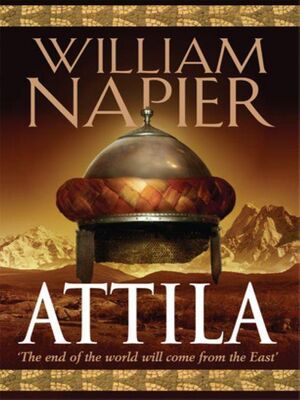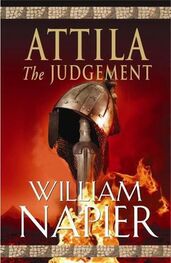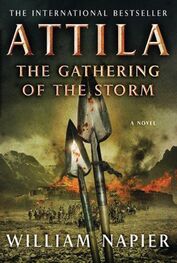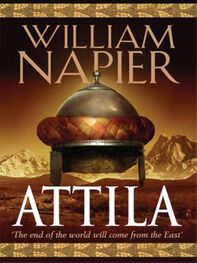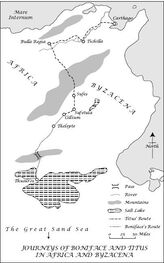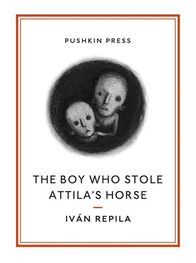Two more days to the east, on the horizon he saw a figure sitting on a horse. The figure did not stir. A full hour later, he pulled up alongside.
‘Stolen?’ he said, indicating the horse.
The other boy nodded.
Attila examined it. ‘Rubbish choice. It’s half spavined already.’
The boy grinned.
Attila grinned, too.
Master and slave rode on into the eastern steppelands together.
Once back in Rome, Aetius was adopted by a high-ranking, self-regarding but not unkindly senatorial family. In the autumn he was given a personal pedagogue, for it was felt that his manners and education must have fallen behind dreadfully during his time with the unwashed Huns.
The boy regarded the pedagogue with a certain aloof scorn. ‘Greek?’
The pedagogue nodded.
‘Ever travelled beyond the Alps? Ever fought in battle? Ever-’
‘Aetius,’ interrupted his adoptive father, ‘that is enough.’
‘No, master,’ said the pedagogue mildly. ‘It is true that I am neither a traveller nor a soldier. But not all men are born for the same tasks.’
Aetius considered for a moment, and thought it a fair enough answer. ‘What is your name?’
‘Priscus,’ said the pedagogue. ‘Priscus of Panium.’
And there, lest I begin to sound as self-important and disingenuous as Caesar in his dubious Gallic Wars, let me cease referring to myself in the third person.
Upon Aetius’ return to Rome from the camp of the Huns, yes, it was I who for two short but rich years was his pedagogue. At sixteen he left home to join the army. But for those two years I shaped and formed him, as I had others, though only five years his senior. And I watched over his progress for fully the next forty years.
As an old man I have come to write the life and times of the most remarkable pupil I ever taught, the most remarkable man I ever knew. Or rather, the life and times of Aetius and Attila. For you cannot write about one without the other. They were sun and moon, they were night and day, they were as destined and inseparable as lovers, as Troilus and Cressida, as Dido and Aeneas. Nothing could separate them, yet nothing in the end could bring them together, either: for the great tide of history, or perhaps the will of the unknown gods, was set against them.
And a more tragic tale of two great men I do not think there has ever been.
LIST OF THE PRINCIPAL PLACE NAMES MENTIONED IN THE TEXT, WITH THEIR MODERN EQUIVALENTS
Modern equivalents marked with an asterisk* are approximations only
Aquileia – a little town still bears the name, on the Laguna di Grado. No Roman remains are visible.
Aquincum – Budapest
Argentoratum – Strasbourg
Augusta Vindelicorum – Augsburg
Baiae – Baia
Balaton, L – Lake Balaton
Beneventum – Benevento
Bononia – Bologna
Britain – England and Wales
Caledonia – Scotland
Campania – the countryside around Capua, known to the Romans as Campania Felix – Happy Campania, on account of its natural beauty, gentle climate and extraordinary fertility, which often allowed three crops a year.
Cannae – Canne della Battaglia
Cappadocia – Central Turkey
Capua – Capua Vetere
Carnuntum – Hainburg*
Caudium – San Martino*
Chersonesus – Sebastopol
Cisalpine Gaul – Lombardy*
Colonia Agrippina – Cologne
Consentia – Cosenza
Cumae – Cuma
Dacia – Romania*
Dubris – Dover
Dumnonia – Devon
Durostorum – Silistra, Romanian-Bulgarian border
Epidaurus – Dubrovnik
Euboea – Evvoia
Euxine Sea – the Black Sea
Falerii – Civita Castellana
Falernus Ager – a district of northern Campania, and origin of the magnificent Falernian wine
Florentia – Florence
Gades – Cadiz
Gallia Narbonensis – that quarter of Gaul commanded from Narbo Martis, or modern Narbonne. Roughly, the Languedoc/Roussillon area.
Gaul – France
Gessoriacum – Boulogne
Harvatha Mountains – the Gothic name for the Carpathians (see ‘Kharvad’)
Illyria – Bosnia/Serbia*
Isca Dumnoniorum – Isca of the Dumnonii, i.e. Exeter
Isca Silurum – Isca of the Silures, i.e. Caerleon
Isle of Mon – Anglesey
Kernow – Cornwall
Kharvad Mountains – the Hun name for the Carpathians (see ‘Harvatha’)
Lauriacum – Enns*
Londinium – London
Lucrine Lake – near Baia. Oysters were first farmed here, by the enterprising Sergius Orata, in the 1 ^ st century BC. He had already made a fortune inventing the domestic shower. See Pliny, Natural History.
Lugdunum Batavorum – Lugdunum of the Batavians, i.e. Leiden
Lutetia – Paris
Margus – Pozarevac, Serbia
Mauritania – Morocco and Northern Algeria*. Not to be confused with present-day Mauritania to the south, virtually unknown to the Roman world.
Mediolanum – Milan
Neapolis – Naples
Noricum – Austria*
Noviomagnus – Chichester
Numidia – Tunisia*
Ophiusa – a Greek name meaning ‘abounding in snakes,’ common throughout the Eastern Mediterranean. Rhodes and Cyprus were each known colloquially as ‘Ophiusa’ – ‘Snake Island.’ Scythian Ophiusa, a Greek trading station on the Euxine, is today’s Odessa, in the Ukraine.
Panium – a humble and unremarked little town in Thrace
Pannonia – Hungary*
Patavium – Padua
Portus Lemanis – Port Lympne, Kent. One of the haunting lost cities of Roman Britain; once a bustling international port with a huge natural harbour, now no more than a few broken walls on a green hillside.
Puteoli – Pozzuoli
Sarmatia – see Scythia
Sarmatian Jazyges – the flat, rich, much-coveted pastureland of the Hungarian Plain, that lies between the Danube and the Tisza.
Scythia – Russia, Ukraine, Kazakhstan, and all points east*
Silestria – Northern Bulgaria*
Siluria – South Wales
Sirmium – Sremska Mitrovica, Yugoslavia
Tanais, R – the River Don, in the Ukraine
Tergestus – Trieste
Teutoberg Forest – Much of present-day Germany. Scholarly consensus now is that the legions of Varus were destroyed near to Osnabruck, north west of the hills still called the Teutoburger Wald.
Tibur – Tivoli
Toletum – Toledo
Trasimene, L – Trasimeno, Lago. The massacre took place between the two villages known to this day as Ossaia and Sanguineto – ‘the place of bones’ and ‘the place of blood.’ Any visitor there will soon understand the brilliance of Hannibal’s huge-scale ambush and use of landscape.
Vangiones – Worms
Vindobona – Vienna
